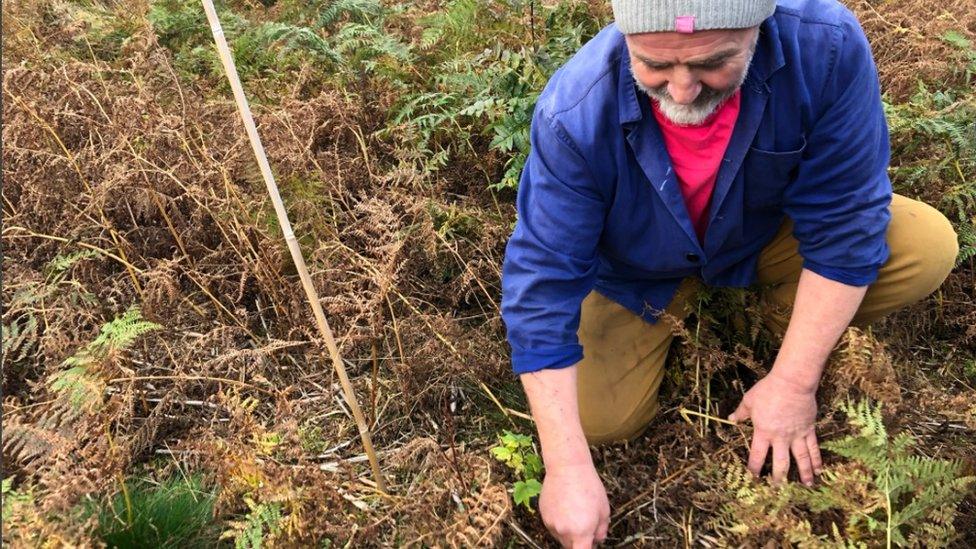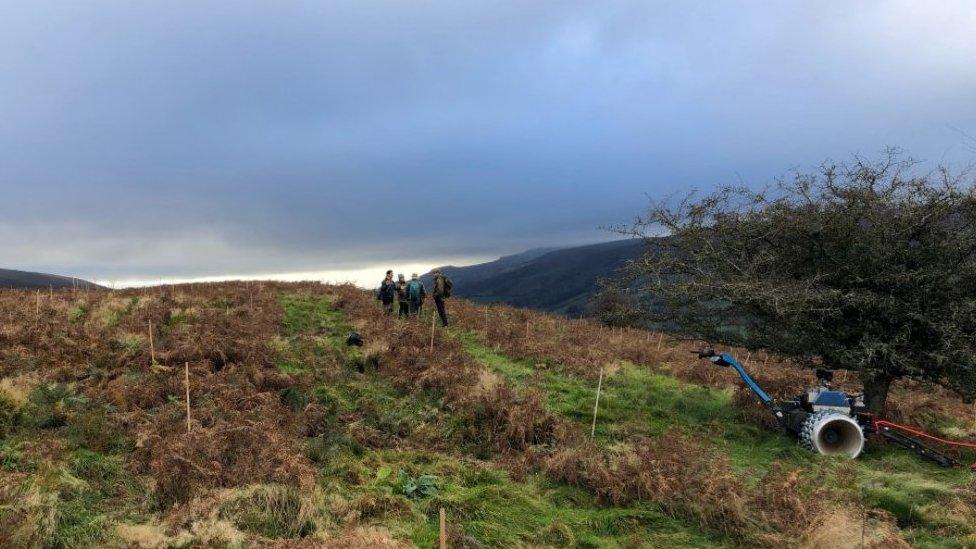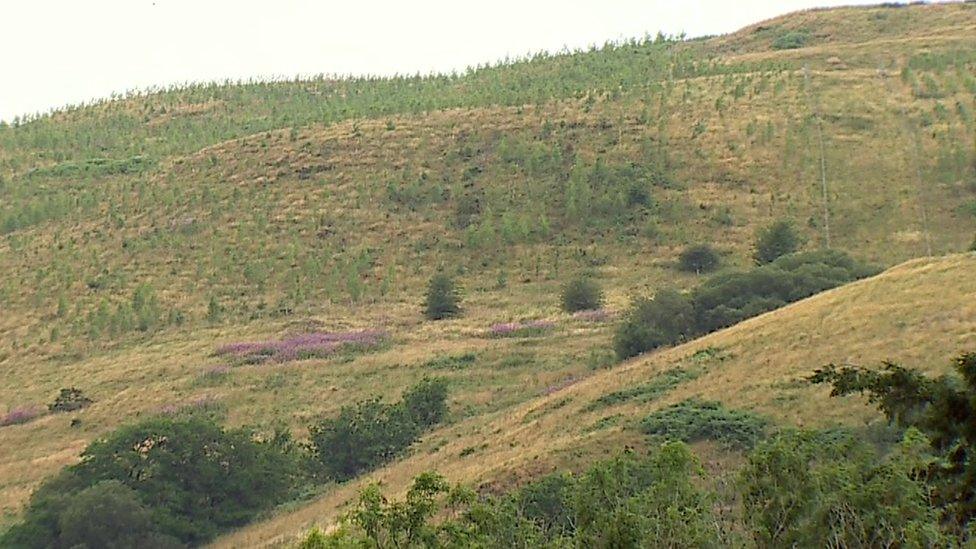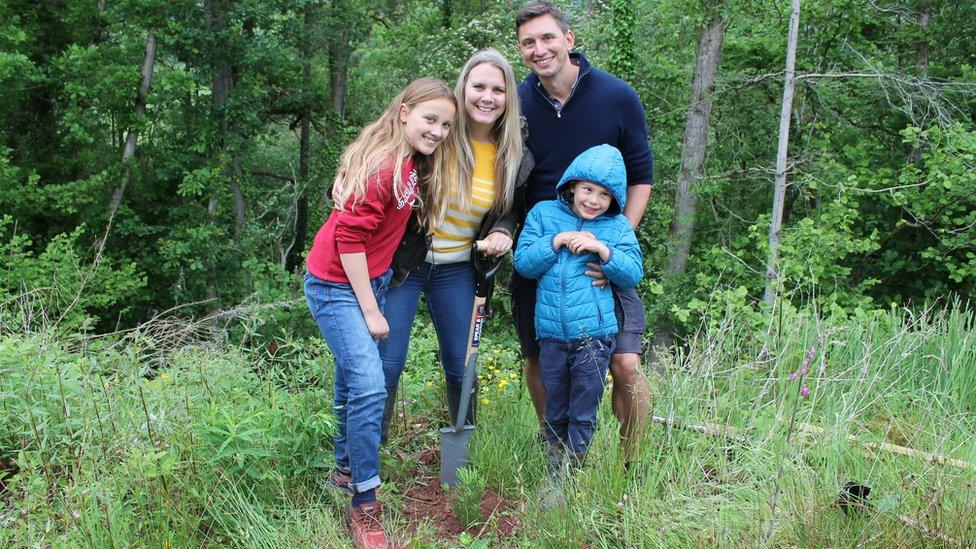Climate change: Tree planting to help rural communities
- Published
- comments

An organisation wants to help farmers make the most of their land without selling
Farmers could turn their poorest land into profitable assets under plans to help rural communities survive.
Large-scale investment companies have been buying farms across the country for afforestation - planting trees to offset carbon emissions.
About 12 sites have been sold recently and the Farmers Union of Wales warned of a threat to culture and language.
A new project called Stump Up for Trees wants to keep land in the hands of people in the area.
The group is urging farmers not to sell up, but to look at carbon offset as an opportunity to use land unsuitable for crops themselves.
A reason big companies outside Wales are buying up the land is to take advantage of Welsh government forestry grants, aimed at encouraging trees to be planted to improve air quality and reduce greenhouse gases.
In the Black Mountains, which straddle Monmouthshire and Powys, thousands of trees have already been planted on land so poor, even sheep do not wander on to its slopes.
If they do stray here, it is a farmer's nightmare to get them back.

There is some land that even sheep will not venture on to
This is common land, but across Wales there are thousands of acres like this covered in bracken, owned by farmers, which is lying largely unused and unprofitable.
But it is this land which the Black Mountains tree planters say could now become key to saving family farms and a way of life.
"We've seen the wholesale purchase and planting of farms by corporates. As a tree planting charity you'd think we'd think it was great, but actually we think its a disaster," said Stump Up for Trees' Keith Powell.
"If you destroy the local economy, there are no jobs, no community. It will also affect our food security and we need to have domestic food security."

Although trees are being planted to offset carbon emissions, there are concerns the loss of farmland harms rural communities
He believes there is enough land in Wales for the country to maintain its food security and wants farmers to make the most of "unproductive land".
The project is working with Coed Cymru, which provides grant advice to farmers.
"We are hoping to make it possible for farmers to have other choices (apart from selling to corporations) and farmers are really up for this from the number of inquiries we are getting," said director Gareth Davies.
Underlining this is the fact London-based utility company UW has invested a large sum of money in the project.
Chief executive Andrew Lindsay believes it is good marketing to be associated with a scheme which is planting trees while not damaging land that could be used for food production.
Protecting livelihoods
He believes other large companies will come to regret buying up farms simply for carbon offsetting that could remain productive in other ways.
"We are definitely seeing big companies coming in with big cheque books saying we've got to plant trees, but its not going to work if it's all about money," he added.
"Trees matter, but people matter, the rural community is already under pressure. We want to be perceived as a company that cares about communities."
NFU Cymru has backed the plans, saying it means farmers make the decisions on where trees are planted and livelihoods are protected.
"Wales has been exploited before, people from outside Wales have made significant amounts of money and we need to make sure people in Wales benefit from the opportunity that Wales can provide," said chief executive John Davies.
Farmers Union of Wales county executive for Gwent and Glamorgan Sharon Pritchard said it was important rural communities kept a "united front".
"It's a massive threat. I was in Maesteg last week where we are talking in the last couple of years over 500 acres had been sold to an outside-of-Wales purchaser, so that grant funding is accessed by that person outside of wales," she said.
"That money is lost to Welsh agriculture. We are seeing it on a weekly basis, worries and concerns that prime agricultural productive land is being taken out of food production."

NO LAUGHING MATTER : An attempt to solve the climate crisis using only the power of comedy
BECAUSE HE'S ELECTRIC: Mike Bubbins' road-trip across Wales in an eco car, will the spark still be there?

Related topics
- Published6 August 2021

- Published30 June 2021
